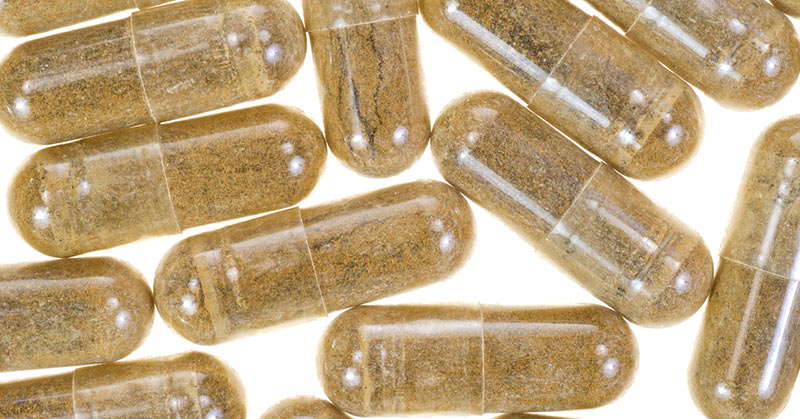So much for health: A study published in the Journal of Hepatology found dietary and herbal supplements lead to liver damage 20 percent of the time.
“While many Americans believe supplements to be safe, government regulations (Dietary Supplement Health and Education Act of 1994) require less safety evidence to market products than what is required for conventional pharmaceuticals” Dr. Victor Navarro, lead study author from Einstein Medical Center Philadelphia, said in a press release. “With less stringent oversight for herbals and dietary supplements, there is greater potential for harmful consequences including life-threatening conditions.””
From 2004 to 2013, Navarro and fellow researchers examined the hepatotoxicity levels in 839 patients suffering from liver injury, focusing specifically on whether levels were a result of taking supplements or medications. Hepatotoxicity is essentially chemically-driven liver damage.
Live Injuries From Supplements Rose 20% in 10-Year Study

And the results showed liver injuries from supplements increased by 20 percent over the almost 10-year study. Bodybuilding supplements cause prolonged jaundice, but non-bodybuilding supplements increase risk for transplants and death by 13 percent. Otherwise medications only increase these chances by three percent.
“Our study group is specific to [certain] centers and therefore we cannot conclude that liver injury due to herbals and dietary supplements in on the rise in the U.S.,” Navarro said. “Further population-based study of liver injury due to herbal products and dietary supplements is needed.”
Editors Note:
Since the original study was conducted in 2014, we would like to provide our readers with a more up to date outlook on exactly which products were associated with liver damage. Please see the passage below.
Which products caused liver damage?
The 2017 US supplement market is worth an estimated 36 billion dollars. With such a massive industry comes various companies, products, and ingredient combinations. This can make it hard to track down exactly which products are causing health issues. According to a more recent 2017 study in Hepatology, many liver injuries have been associated with bodybuilding agents, green tea extract, and products containing multiple ingredients. From a total of 130 reported cases of liver injury, 45 were attributed to bodybuilding agents, which are thought to be illegally adulterated with anabolic steroids. The remaining 85 cases not associated with bodybuilding agents were attributed to various subcategories. These include single or multiple named herbal products (eg. black cohosh, green tea, kratom), traditional herbal mixtures (eg. Chinese or Ayurvedic herbs), vitamin or mineral or dietary supplement (eg. niacin or multivitamins), and products with multiple ingredients. The products with multiple ingredients accounted for a majority (68%) of the 85 cases. They included product names such as “Slimquick,” “Herbalife,” “Hydroxycut,” and “Move Free.” Unfortunately assessing which ingredients caused the liver damage in the first place is hard, as the products in question contained anywhere from 3 to 20 different ingredients.
Talk to Your Doctor About Your Supplements

A better bet is to consult your doctor before raiding the supplement aisle. Before that, reassess your diet and see if it’s lacking natural food sources of essential vitamins. Light tofu, cooked spinach, avocados, and almonds are rich in E, while salmon, eggs, mushrooms, and ricotta cheese are rich in D.
Same goes for those interested in dietary supplements. Either consult your doctor or reassess your current diet and lifestyle. Improving overall diet quality doesn’t lead to weight loss, but it reduces the risk for a slew of additional disease, like cardiovascular disease and diabetes.
Taking a supplement to bulk up? Switch to sprint intervals versus hours on the treadmill, as well as six small, protein- and carb-rich meals per day.

Sources
- Navarro V, Barnhart H, Bonkovsky H, Davern T, Fontana R, et al. (2014, July) Liver injury from herbals and dietary supplements in the U.S. Drug-Induced Liver Injury Network. Hepatology. 2014. Retrieved from: https://aasldpubs.onlinelibrary.wiley.com/doi/full/10.1002/hep.27317
- Navarro, V., Khan, I., Björnsson, E., Seeff, L. B., Serrano, J., & Hoofnagle, J. H. (2017, January). Liver Injury from Herbal and Dietary Supplements. Retrieved March 15, 2018, from https://www.ncbi.nlm.nih.gov/pmc/articles/PMC5502701/
- https://www.statista.com/statistics/235801/retail-sales-of-vitamins-and-nutritional-supplements-in-the-us/

